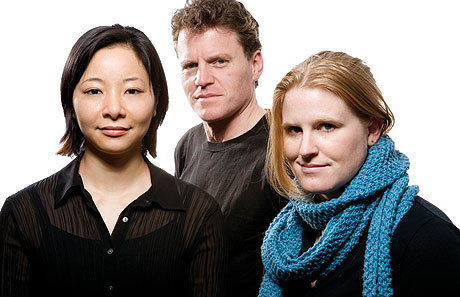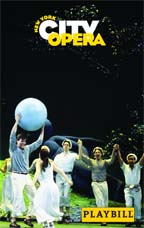 |
.gif) |


| ||||||
By Daniel Felsenfeld
20 Apr 2006
New York City Opera’s unique Vox: Showcasing American Composers festival, which returns for its eighth season next month, helps composers bridge the gap from page to stage, and gives audiences a sneak peek at the new.
Imagine yourself a landscape painter with a vast, involved canvas in mind. You've made studies, planned the scale and scope, conquered the technical challenges, mixed the colors, stretched and gessoed the canvas, cleaned the brushes, and are ready to execute the work. The trouble is that you may not be able to see your painting when it's done.
How can you make your work beautiful without the crucial, rudimentary, presumed step of being able to look at it? Such is the lot of many an opera composer: a wrong that New York City Opera's VOX: Showcasing American Composers series aims to help put right. By annually presenting a series of semi-staged orchestral readings of operatic works in progress, City Opera's forward-thinking generosity allows American composers and their collaborators to hear--in the spectacular Technicolor offered by the singers and orchestra of one of the world's premiere opera companies--music that otherwise only exists on paper. The series also strives to help audiences broaden their concept of opera and experience just how au courant opera genuinely is, to help extend the genre's life and infuse it with a touch of the now.
In 2004 I was lucky enough to have been selected as one of VOX's ten anointed composers: my own Summer and All It Brings, a 20-minute opera for solo soprano, narrator, and chamber orchestra written in collaboration with poet Ernest Hilbert, was given a thoughtful, beautiful "reading"--really a polished, professional-level performance--by these miraculous forces. Only clichés like "the heavens opened" or "the scales were lifted from my eyes" can hint at explaining what I felt that afternoon. It was as if my own musical world, the sounds and sweet airs I had imagined in my head, was suddenly suffused with a psychedelic jolt of shocking euphoria--Dorothy landing in Oz. What were once scratches on paper, flicks of my pencil done alone, late at night, became joyful public drops of light; driving, incisive rhythmic notions from my head became terrifying sonic juggernauts on stage; melodies I had only sung to myself (in my scratchy, on-pitch-but-ugly voice) came to vivid life. Conductor Gary Thor Wedow led the City Opera Orchestra with power and precision, understanding my work in a way I had not thought possible, accompanying the gossamer soprano of Angela Fout and the effectively callow-voiced narration of bass-baritone Matthew Burns. It was, to date, one of the best musical days of my life--a life spent in music. The experience of hearing an orchestra, especially that orchestra, working on my behalf is a thrill from which nobody in my position could ever recover.
Since 1999 the VOX program, brainchild of City Opera's then composer-in-residence Deborah Drattell, has been in a state of perpetual evolution. It began as a way to utilize extra rehearsal hours owed the orchestra. Since 1999, VOX has played host to well over sixty new works, ranging from pieces by accomplished composers like Mark Adamo, Richard Danielpour, David Del Tredici, John Eaton, Michael John La Chiusa, Bernard Rands, Bright Sheng, and Charles Wuorinen, to younger hopefuls like myself and dozens more.
Apparently, the opportunity is no less thrilling to the more tried and true composers than it is to us neophytes. "I wish that every opera company in America had a VOX season," says composer John Eaton, whose terrifying The Reverend Jim Jones appeared alongside my own work in 2004. "There is nothing more helpful in making the public aware of the richness and variety of operatic music being written today. The composers represent the entire country. In fact, I would go so far as to say that the VOX season is a National Treasure!"
This program is not only unique to City Opera, it is uniquely City Opera as well, fitting squarely within the company's mission. "Just as no other company in the history of this form on this continent has spearheaded in its mainstage repertory the new, the progressive, and the visionary as consistently as New York City Opera," says composer-in-residence Mark Adamo, "no other company (predictably) has ever undertaken and maintained so grandly scaled (both in repertory and orchestral forces) so confident and urgent a festival of new music-theater since opera was first sung on American shores."
Yuval Sharon, who has recently assumed the newly created role of VOX Project Director, concurs. "Throughout the season," he says, "we see a healthy number of young singers, but this is a great chance to focus on some of the new talent in another aspect of opera. People look to City Opera for less conventional repertoire. We look for a less traditional--but decidedly American--way to think about what opera is. When you look back on the company's history, with its connection to so many important American operas, it becomes clearer that it is up to us to look to the next generation of composers."
Each year's VOX is an improvement of and enlargement on the preceding, and this year is no exception. Its new location, the splendidly equipped Skirball Center at NYU, will allow a big leap forward. "It is my hope," says Sharon, "that this will open up the program to the downtown audience, the people who like and do new music but who might not think about opera." This is also the first year in which electronics will be incorporated, though they have been used in more avant-garde circles for half a century. And each year, the press profile of the series has also been augmented, with the New York Times regularly covering the event from a news standpoint, while refraining from offering critiques of the works-in-progress. Momentum has even gathered internally, with more City Opera staff members now involved in the selection, preparation, and presentation of the works. "As the program is growing," says Sharon, "people are realizing it is everyone's project. Not just a small thing we do on the side, but actually part of the season."
The composers in the enviable position of being showcased this year demonstrate, in their musical span and choice of topics, the infinite variety of the most cutting-edge American thinking about opera. From an operatic version of Tom Stoppard's seminal Rosencrantz and Guildenstern are Dead, to a setting of a novel about African-American life on the eve of the Civil War, to an operatic depiction of the life of Charles Ives and his courtship of Harmony Twitchell against the wishes of her godfather, Mark Twain, this set of pieces will run the gamut in both subject matter and musical style. "What I love about the Showcase," says Sharon, "is the variety: no two composers sound alike; each of the 12 pieces has a distinct voice."
As American composers, we hope for a paradigm shift in which mainstream culture will once again become invested in "high art", in which opera can once again become the vital force it once was. As VOX demonstrates, the genre certainly teems with life. "If," says Adamo, "If every ambitious company in the United States devotes its ultimate spring engagement to a festival of the new--the untried, but still true--then the golden age of new American opera we constantly speculate is materializing will have arrived, on time, in full."
Daniel Felsenfeld is a New York-based composer and author.
 |
|
| Left to right: composers Justine F. Chen,
Herschel Garfein, and Jenny O. Johnson | |
| photo by Fadi Kheir Photography |
Send questions and comments to the Webmaster
Copyright © 2005
Playbill, Inc. All Rights Reserved.
|
|
||
|
SIGN UP for the PlaybillArts Club and enjoy special opportunities and discount ticket offers for classical music, opera, dance, and jazz events. |
||
|
|
||
|
Maurizio Pollini returns to Chopin and an acclaimed young violinist's debut album reaches American shores. |
||
| The
Yundi Li-Lang Lang 'Rivalry'; Cover Girl Anna Netrebko; a Classical
Celebrity Encounter
What the stars are up to onstage and off. |
||
|
Email this page to a friend! |
||
